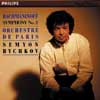Rachmaninov Symphony No.2
View record and artist detailsRecord and Artist Details
Composer or Director: Sergey Rachmaninov
Label: Philips
Magazine Review Date: 9/1991
Media Format: CD or Download
Media Runtime: 58
Mastering:
DDD
Catalogue Number: 432 101-2PH

Tracks:
| Composition | Artist Credit |
|---|---|
| Symphony No. 2 |
Sergey Rachmaninov, Composer
Orchestre de Paris Semyon Bychkov, Conductor Sergey Rachmaninov, Composer |
Composer or Director: Sergey Rachmaninov
Label: Philips
Magazine Review Date: 9/1991
Media Format: Cassette
Media Runtime: 0
Mastering:
DDD
Catalogue Number: 432 101-4PH

Tracks:
| Composition | Artist Credit |
|---|---|
| Symphony No. 2 |
Sergey Rachmaninov, Composer
Orchestre de Paris Semyon Bychkov, Conductor Sergey Rachmaninov, Composer |
Author: Edward Seckerson
Consider the opening. Bychkov's pronounced rubatos and dynamic shadings do not obtrude but rather shape the mood and colour the atmosphere. The ebb and flow of the music is quickly established, the overlapping string lines building to an eminently rich-textured first climax. The first theme of the second group is elegantly turned, the second rather more expansive with deft pointing of Rachmaninov's filigree; the Paris strings shine. Bychkov has cultivated a vibrant sostenuto, a genuine awareness of Rachmaninov's long-breathed phrase lengths. No exposition repeat, but that is fine by me—there are no other cuts here. In the brooding development one begins to pick up on all kinds of inner-detail (bass clarinet and bassoons worming their way through the texture), all of it adding considerably to the urgency. There is a mighty climax and the recapitulation brings an impassioned response to the harmony (counterpointing strings and horns) in the principal second subject. All very satisfying, and exciting, too, though I'm not entirely convinced by the crude timpani pay-off (an unmarked fortissimo E supporting the cellos and basses—a number of other conductors have also adopted this custom).
I am convinced by Bychkov's invigorating tempo for the scherzo, not least for the boldest possible contrast it makes with the second subject which Bychkov unashamedly sinks into like a large comfortable cushion. A rich-toned clarinet effects the transition, easing the tempo most seductively—a preview of his eloquent slow movement solo. It is a very romantic dappled colour that Bychkov conjures in the latter stages of this slow movement. His violins steal in most affectingly with their wistful reprise of the clarinet tune, and notable too is the sensitivity with which the woodwind counterpoints are woven around it.
The finale goes with a swing, and if one has previously had any doubts, they are dispelled here on the journey to Rachmaninov's fabulous coda. Again, there is lots of satisfying inner-part detail to keep the ear alerted, and a real slavic surge to the re-emergence of the big tune. The ensuing maestoso is as uplifting as I've ever heard it (listen to the timpani come through to reinforce the rhythm in the clinching bars) and Bychkov really throws his hat in the air with the final presto. I wouldn't be so rash as to commend his version here and now over the likes of Previn (EMI—currently nla) or Litton (Virgin)—though in some ways he is more red-bloodedly idiomatic than either—but with rosy and immediate Philips sound adding to its allure, this may well be for you. Hear it if you can.'
Discover the world's largest classical music catalogue with Presto Music.

Gramophone Digital Club
- Digital Edition
- Digital Archive
- Reviews Database
- Full website access
From £8.75 / month
Subscribe
Gramophone Full Club
- Print Edition
- Digital Edition
- Digital Archive
- Reviews Database
- Full website access
From £11.00 / month
Subscribe
If you are a library, university or other organisation that would be interested in an institutional subscription to Gramophone please click here for further information.





